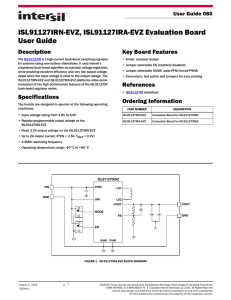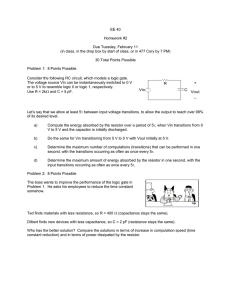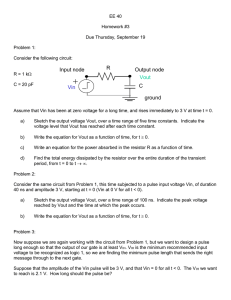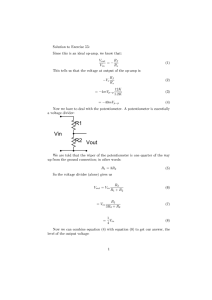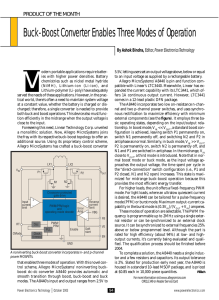ISL9120IIx-EVZ User Guide
advertisement
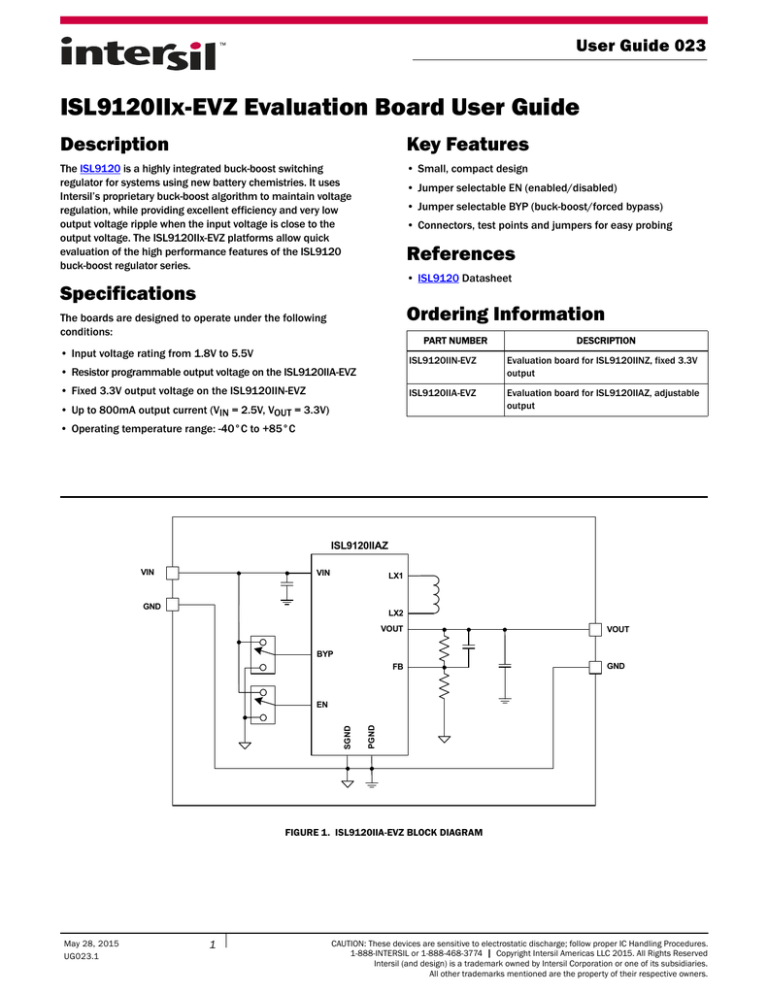
User Guide 023 ISL9120IIx-EVZ Evaluation Board User Guide Description Key Features The ISL9120 is a highly integrated buck-boost switching regulator for systems using new battery chemistries. It uses Intersil’s proprietary buck-boost algorithm to maintain voltage regulation, while providing excellent efficiency and very low output voltage ripple when the input voltage is close to the output voltage. The ISL9120IIx-EVZ platforms allow quick evaluation of the high performance features of the ISL9120 buck-boost regulator series. • Small, compact design • Jumper selectable EN (enabled/disabled) • Jumper selectable BYP (buck-boost/forced bypass) • Connectors, test points and jumpers for easy probing References • ISL9120 Datasheet Specifications Ordering Information The boards are designed to operate under the following conditions: PART NUMBER • Input voltage rating from 1.8V to 5.5V • Resistor programmable output voltage on the ISL9120IIA-EVZ • Fixed 3.3V output voltage on the ISL9120IIN-EVZ DESCRIPTION ISL9120IIN-EVZ Evaluation board for ISL9120IINZ, fixed 3.3V output ISL9120IIA-EVZ Evaluation board for ISL9120IIAZ, adjustable output • Up to 800mA output current (VIN = 2.5V, VOUT = 3.3V) • Operating temperature range: -40°C to +85°C ISL9120IIAZ VIN VIN LX1 GND LX2 VOUT VOUT BYP FB GND PGND SGND EN FIGURE 1. ISL9120IIA-EVZ BLOCK DIAGRAM May 28, 2015 UG023.1 1 CAUTION: These devices are sensitive to electrostatic discharge; follow proper IC Handling Procedures. 1-888-INTERSIL or 1-888-468-3774 | Copyright Intersil Americas LLC 2015. All Rights Reserved Intersil (and design) is a trademark owned by Intersil Corporation or one of its subsidiaries. All other trademarks mentioned are the property of their respective owners. User Guide 023 Functional Description The ISL9120IIx-EVZ evaluation boards provide simple platforms to demonstrate the features of the ISL9120 buck-boost regulator. The ISL9120IIN-EVZ is for the fixed 3.3V output IC ISL9120IINZ. The ISL9120IIA-EVZ is for the adjustable output IC ISL9120IIAZ. The evaluation boards have been functionally optimized for best performance of the ISL9120 IC series. The input power and load connections are provided through multipin connectors for high current operations. The ISL9120IIA-EVZ evaluation board schematic is shown in Figure 5, on page 3. The board’s enable function is controlled by the on-board jumper header J3. Similarly, the forced bypass function is controlled by the on-board jumper header J4. The schematic for the ISL9120IIN-EVZ is shown in Figure 7. The PCB layout images for all layers are shown in Figures 8 and 9. The bill of materials for the ISL9120IIA-EVZ is shown in Table 2 on page 4. The bill of materials for the ISL9120IIN-EVZ is shown in Table 3 on page 5. TABLE 1. OUTPUT VOLTAGE PROGRAMMING For ISL9120IIA-EVZ DESIRED OUTPUT VOLTAGE (V) R2 RESISTOR VALUE (k) 2.0 124 2.5 88.7 3.0 68.1 3.3 60.4 3.4 57.6 4.0 46.4 4.5 40.2 5.0 35.7 EN (2V/DIV) Operating Range The VIN range of the boards is 1.8V to 5.5V. The VOUT range for the ISL9120IIA-EVZ is 2V to 5V. The IOUT range of the boards is 0 to 1A. The operating ambient temperature range is -40°C to +85°C. VOUT (1V/DIV) Quick Start Guide For the ISL9120IIA-EVZ board, the default output voltage is set at 3.3V. Should other output voltages be desired, resistor R2 can be changed to set to a desired voltage as shown in Table 1 (use a resistor with 1% accuracy). Refer to the following Quick Setup Guide to configure and power up the board for proper operation. During the power-on process, the expected waveforms are shown in Figures 2 and 3. Quick Setup Guide IL (500mA/DIV) 400µs/DIV FIGURE 2. SOFT-START (VIN = 3V, VOUT = 3.3V, NO LOAD) EN (2V/DIV) 1. Install jumper on J3, shorting EN to VIN. 2. Install jumper on J4, shorting BYP to GND. 3. Connect power supply to J1, with voltage setting between 1.8V and 5.5V. VOUT (1V/DIV) 4. Connect electronic load to J2. 5. Place scope probes on the VOUT test point and other test points of interest. 6. Turn on the power supply. 7. Monitor the output voltage start-up sequence on the scope. The waveforms will look similar to that shown in Figures 2 and 3. 8. Turn on the electronic load. 9. Measure the output voltage with the voltmeter. The voltage should regulate within datasheet spec limits. IL (500mA/DIV) 400µs/DIV FIGURE 3. SOFT-START (VIN = 4V, VOUT = 3.3V, NO LOAD) Recommended PCB Layout Correct PCB layout is critical for proper operation of the ISL9120. The input and output capacitors should be positioned as closely to the IC as possible. The ground connections of the input and output capacitors should be kept as short as possible and should be on the component layer to avoid problems that are caused by high switching currents flowing through PCB vias. Submit Document Feedback 2 UG023.1 May 28, 2015 User Guide 023 FIGURE 4. ISL9120IIA-EVZ EVALUATION BOARD FIGURE 5. ISL9120IIA-EVZ EVALUATION BOARD SCHEMATIC Submit Document Feedback 3 UG023.1 May 28, 2015 User Guide 023 TABLE 2. ISL9120IIA-EVZ EVALUATION BOARD BILL OF MATERIALS ITEM# QTY REFERENCE DESIGNATOR PART TYPE FOOTPRINT DESCRIPTION MANUFACTURER 1 1 U1 ISL9120IIAZ W3x3.9E; WLCSP Intersil ISL9120 Buck-boost Regulator with Adjustable Output Voltage INTERSIL 2 1 L1 1µH 0806 Power Inductor Toko DFE201610R series, 2.7A (typ), 80mΩ (typ) TOKO 3 1 C1 150µF 1210 Capacitor, Tantalum ANY 4 1 C2 10µF/16V/X5R 0603 Capacitor, Generic ANY 5 1 C3 47µF/6.3V/X5R 0603 Capacitor, Generic ANY 6 1 C4 22pF 0402 Capacitor, Generic ANY 7 1 R1 187kΩ1% 0402 Resistor, Generic ANY 8 1 R2 60.4kΩ1% 0402 Resistor, Generic ANY 9 2 R3, R4 1MΩ5% 0603 Resistor, Generic ANY 10 2 J1, J2 HDR-6 HDR-6 Vert. Pin Header, 6-Pin, 0.1” Spacing, Generic ANY 11 2 J3, J4 HDR-3 HDR-3 Vert. Pin Header, 3-Pin, 0.1” Spacing, Generic ANY 12 4 TP1, TP2, TP3, TP4 Terminal Pin 0.052" hole Test Point, Terminal Pin Turret 0.082" [2110-2-00-80-00-00-07-0] MILL MAX MANUFACTURING CORP. FIGURE 6. ISL9120IIN-EVZ EVALUATION BOARD Submit Document Feedback 4 UG023.1 May 28, 2015 User Guide 023 ISL9120IIN-EVZ Evaluation Board Schematic J1 U1 1 2 3 4 5 6 A2 VIN C1 150uF TP1 LX1 ISL9120_EVZ VIN LX1 A1 C2 10uF LX1 TP2 LX2 L1 1uH TP3 VOUT PGND LX2 VIN BYP A3 EN VOUT FB J2 VOUT R1 0 C3 C4 DNP C3 47uF FB PGND 1 2 3 4 5 6 VOUT R2 DNP B1 B3 EN LX2 C2 BYP PGND B2 SGND EN C1 TP4 GND BYP 1 2 3 VIN EN R3 1 2 3 1M J3 VIN BYP R4 1M J4 FIGURE 7. ISL9120IIN-EVZ EVALUATION BOARD SCHEMATIC TABLE 3. ISL9120IIN-EVZ EVALUATION BOARD BILL OF MATERIALS ITEM# QTY REFERENCE DESIGNATOR PART TYPE FOOTPRINT 1 1 U1 ISL9120IINZ, W3x3.9E; WLCSP 2 1 L1 1µH 0806 Power Inductor Toko DFE201610R series, 2.7A (typ), 80mΩ (typ) TOKO 3 1 C1 150µF 1210 Capacitor, Tantalum ANY 4 1 C2 10µF/16V/X5R 0603 Capacitor, Generic ANY 5 1 C3 47µF/6.3.V/X5R 0603 Capacitor, Generic ANY 6 1 C4 DNP 0402 7 1 R1 0Ω 0402 8 1 R2 DNP 0402 9 2 R3, R4 1MΩ5% 0603 Resistor, Generic ANY 10 2 J1, J2 HDR-6 HDR-6 Vert. Pin Header, 6-Pin, 0.1” Spacing, Generic ANY 11 2 J3, J4 HDR-3 HDR-3 Vert. Pin Header, 3-Pin, 0.1” Spacing, Generic ANY 12 4 TP1, TP2, TP3, TP4 Terminal Pin 0.052" hole Test Point, Terminal Pin Turret 0.082" [2110-2-00-80-00-00-07-0] MILL MAX MANUFACTURING CORP. Submit Document Feedback 5 DESCRIPTION Intersil ISL9120 Buck-Boost Regulator MANUFACTURER INTERSIL ANY Resistor, Generic ANY ANY UG023.1 May 28, 2015 User Guide 023 PCB Layout FIGURE 8. TOP LAYER FIGURE 9. BOTTOM LAYER Intersil Corporation reserves the right to make changes in circuit design, software and/or specifications at any time without notice. Accordingly, the reader is cautioned to verify that the document is current before proceeding. For information regarding Intersil Corporation and its products, see www.intersil.com Submit Document Feedback 6 UG023.1 May 28, 2015
